
I hope that 2007 brings happiness to all.
 The Seoul city government has done a lot to develop Cheonggyecheon and Namsan by making them more accessible and pleasant for walkers. They've added a number of other parks, and I think that this devopment plan for a parklike plaza in front of Gwanghwamun is nice.
The Seoul city government has done a lot to develop Cheonggyecheon and Namsan by making them more accessible and pleasant for walkers. They've added a number of other parks, and I think that this devopment plan for a parklike plaza in front of Gwanghwamun is nice.
"To prevent traffic jams, the city government plans to encourage drivers to avoid Sejongno."
 I read this article in the International Herald Tribune, Meat and the planet. It's one of the many things that we should be concerned about but usually don't think it's really very important.
I read this article in the International Herald Tribune, Meat and the planet. It's one of the many things that we should be concerned about but usually don't think it's really very important.Global livestock grazing and feed production use "30 percent of the land surface of the planet." Livestock — which consume more food than they yield — also compete directly with humans for water. And the drive to expand grazing land destroys more biologically sensitive terrain, rain forests especially, than anything else.
Cows also soak up vast amounts of water: it takes a staggering 990 litres of water to produce one litre of milk.
 I might give Mr. Kim's camp a miss though just for his idiotic suggestion. "Mr. Kim suggests parents establish an 'English Zone [in their homes].' For example, in the morning, English could be mandatory when in the bathroom."
I might give Mr. Kim's camp a miss though just for his idiotic suggestion. "Mr. Kim suggests parents establish an 'English Zone [in their homes].' For example, in the morning, English could be mandatory when in the bathroom."Min Soo: Good morning, Peter (or whatever little Korean kids call their thing).
Peter: Hi, Min Soo.
Min Soo: What you doing now?
Peter: I just hang around. Later I going with you. OK?
Min Soo: (looking in the mirror) Hey, good looking. You hot today.
 When I saw this "study" in the news, I thought, "There must be an incredibly disproportionate number of Libras (born September 23-October 22) and Aquarians (January 20-February 18) living in Seoul." A study by InsuranceHotline.com found that Libras and Aquarians have the most traffic accidents whereas Leos and Geminis (that's me) have the least. Perhaps being a Libra or an Aquarian is a requirement for taxi drivers and motorcyclists.
When I saw this "study" in the news, I thought, "There must be an incredibly disproportionate number of Libras (born September 23-October 22) and Aquarians (January 20-February 18) living in Seoul." A study by InsuranceHotline.com found that Libras and Aquarians have the most traffic accidents whereas Leos and Geminis (that's me) have the least. Perhaps being a Libra or an Aquarian is a requirement for taxi drivers and motorcyclists."Our internal investigation has found that the diplomat did not drive under the influence of alcohol," an official told the AFP news agency.
 Lately, I've been watching quite a bit of sports on TV. The 2006 Volleyball World Championship in Japan was excellent - although it seemed poorly attended. The audiences at most of the games seemed to fill about 10% of the hall. I really enjoy watching and playing volleyball, so I don't really understand the lack of interest. Of course, the Canadian men's team lost most of their games, but they did win the one that counted most to me: Canada 3 - Korea 1. The game is much more interesting now with the new scoring rules, and the men's game, which I used to find boring because no one ever seemed able to return a spike, has really developed. There are a lot more blocks and spike pick-ups. This is a game that most people can play easily. It has lots of action. Where's the interest?
Lately, I've been watching quite a bit of sports on TV. The 2006 Volleyball World Championship in Japan was excellent - although it seemed poorly attended. The audiences at most of the games seemed to fill about 10% of the hall. I really enjoy watching and playing volleyball, so I don't really understand the lack of interest. Of course, the Canadian men's team lost most of their games, but they did win the one that counted most to me: Canada 3 - Korea 1. The game is much more interesting now with the new scoring rules, and the men's game, which I used to find boring because no one ever seemed able to return a spike, has really developed. There are a lot more blocks and spike pick-ups. This is a game that most people can play easily. It has lots of action. Where's the interest? The Asian Games in Doha have also been on TV a lot. Which brings me to the original purpose of this post - boring sports. Now I used to think that darts (a pseudo sport if there ever was one - played by fat, out-of-shape middle-aged guys) was the most boring sport in the world. I have changed my mind. Taekwondo is truly the most boring "sport" that I've ever seen. In the Asian Games, I can't count the number of rounds I saw that passed without anyone throwing a punch or a kick. They just bounced on their toes for a couple of minutes and then sat down and got toweled off and drank a little more energy drink (It must have been hot in the arena because they never did enough to sweat). How many sports are there where the referee has to constantly tell the participants to fight? In the matches that I watched there were more penalty points taken off than points awarded. I can't say that I watched most of the fights until they ended. I suspect that most of the fighters won by getting scores like -2 compared to their opponents -5. When there was an occasional exchange of blows, no points are awarded for what looked like a good shot to me. People lashing out while falling on their ass seemed to be able to score. Maybe they should dispense with the padding, gloves, and head gear and just go at it until only one person is standing (Oh, wait. That sounds like K-1).
The Asian Games in Doha have also been on TV a lot. Which brings me to the original purpose of this post - boring sports. Now I used to think that darts (a pseudo sport if there ever was one - played by fat, out-of-shape middle-aged guys) was the most boring sport in the world. I have changed my mind. Taekwondo is truly the most boring "sport" that I've ever seen. In the Asian Games, I can't count the number of rounds I saw that passed without anyone throwing a punch or a kick. They just bounced on their toes for a couple of minutes and then sat down and got toweled off and drank a little more energy drink (It must have been hot in the arena because they never did enough to sweat). How many sports are there where the referee has to constantly tell the participants to fight? In the matches that I watched there were more penalty points taken off than points awarded. I can't say that I watched most of the fights until they ended. I suspect that most of the fighters won by getting scores like -2 compared to their opponents -5. When there was an occasional exchange of blows, no points are awarded for what looked like a good shot to me. People lashing out while falling on their ass seemed to be able to score. Maybe they should dispense with the padding, gloves, and head gear and just go at it until only one person is standing (Oh, wait. That sounds like K-1). I practiced Taekwondo years ago, and I don't remember it being so boring. In fact, I think I got punched and kicked quite a bit.
I practiced Taekwondo years ago, and I don't remember it being so boring. In fact, I think I got punched and kicked quite a bit. As well, I want to get a web domain and do some things with online material. For years, I've been fiddling around with some really basic HTML because I've been making exercises with Hot Potatoes, but I don't really understand it well, so I picked up a book called Head First: HTML with CSS & XHTML. It's only 658 pages. Luckily, it has a lot of pictures and graphics.
As well, I want to get a web domain and do some things with online material. For years, I've been fiddling around with some really basic HTML because I've been making exercises with Hot Potatoes, but I don't really understand it well, so I picked up a book called Head First: HTML with CSS & XHTML. It's only 658 pages. Luckily, it has a lot of pictures and graphics. As I get older and I get more concerned about my health, I get crankier and less tolerant. I am sick to death with hearing about smokers' rights. I can't walk out of my apartment on any day at any time and go more than a 100 meters without breathing second-hand smoke. I can't walk out of any building on campus during the break between classes without walking through a cloud of smoke because all the smokers go outside and mass around the doors (Thanks, guys. That really helps.). I feel like turning a firehose on them. The 2nd and 3rd floors of the professors' wing in our building stinks of cigarette smoke leaking out of the professors' offices - even though there is a ban on smoking in the building. I've even seen smokers standing inside a building by an open window as though that would really make a difference.
As I get older and I get more concerned about my health, I get crankier and less tolerant. I am sick to death with hearing about smokers' rights. I can't walk out of my apartment on any day at any time and go more than a 100 meters without breathing second-hand smoke. I can't walk out of any building on campus during the break between classes without walking through a cloud of smoke because all the smokers go outside and mass around the doors (Thanks, guys. That really helps.). I feel like turning a firehose on them. The 2nd and 3rd floors of the professors' wing in our building stinks of cigarette smoke leaking out of the professors' offices - even though there is a ban on smoking in the building. I've even seen smokers standing inside a building by an open window as though that would really make a difference.Age-standardized prevalences of smoking were 74.8% and 2.9% for men and women respectively, with no urban-rural difference. (from a 1992-93 study by Chung MH, Chung KK, Chung CS, Raymond JS School of Public Health, Seoul National University, Korea ).
South Korea has the largest smoking population of all OECD member countries estimated at 12 million out of 47 million in 2004. The smoking penetration in South Korea is fairly high as close to 55% of men are smokers. Women smokers are also not uncommon in these days. (from a Euromonitor study in 2004)
The cost of malignant tumors caused by smoking was $1.86 billion and cardiovascular disease accounted for $1.55 billion. Respiratory disease accounted for the lowest costs at $.51 billion.
Among Organization for Economic Co-operation and Development (OECD) countries, Korea has the highest percentage of males, ages 15 and over, that are daily smokers (Korea: 69.9 percent, Australia: 21.4 percent, Canada: 20.2 percent, France: 32.0 percent, Japan: 52.0 percent, UK: 28.0 percent, US: 20.2 percent). (from an ISPOR study presented in 2004)
When the former KGB agent Alexander Litvinenko was found to have been poisoned by radioactive polonium 210 last week, there was one group that must have been particularly horrified: the tobacco industry. The industry has been aware at least since the 1960s that cigarettes contain significant levels of polonium.
...
Pack-and-a-half smokers are dosed to the tune of about 300 chest X-rays.
Is it therefore really correct to say, as Britain's Health Protection Agency did this week, that the risk of having been exposed to this substance remains low? That statement might be true for whatever particular supplies were used to poison Litvinenko, but consider also this: London's smokers (and those Londoners exposed to second-hand smoke), taken as a group, probably inhale more polonium 210 on any given day than the former spy ingested with his sushi.
...
The World Health Organization estimates that 10 million people will be dying annually from cigarettes by the year 2020 - a third of these in China. Cigarettes, which claimed about 100 million lives in the 20th century, could claim close to a billion in the present century.
In sixth grade Mrs. Walker
slapped the back of my head
and made me stand in the corner
for not knowing the difference
between persimmon and precision.
How to choose
persimmons. This is precision.
Ripe ones are soft and brown-spotted.
Sniff the bottoms. The sweet one
will be fragrant. How to eat:
put the knife away, lay down newspaper.
Peel the skin tenderly, not to tear the meat.
Chew the skin, suck it,
and swallow. Now, eat
the meat of the fruit,
so sweet,
all of it, to the heart.
Donna undresses, her stomach is white.
In the yard, dewy and shivering
with crickets, we lie naked,
face-up, face-down.
I teach her Chinese.
Crickets: chiu chiu. Dew: I've forgotten.
Naked: I've forgotten.
Ni, wo: you and me.
I part her legs,
remember to tell her
she is beautiful as the moon.
Other words
that got me into trouble were
fight and fright, wren and yarn.
Fight was what I did when I was frightened,
fright was what I felt when I was fighting.
Wrens are small, plain birds,
yarn is what one knits with.
Wrens are soft as yarn.
My mother made birds out of yarn.
I loved to watch her tie the stuff;
a bird, a rabbit, a wee man.
Mrs. Walker brought a persimmon to class
and cut it up
so everyone could taste
a Chinese apple. Knowing
it wasn't ripe or sweet, I didn't eat
but watched the other faces.
My mother said every persimmon has a sun
inside, something golden, glowing,
warm as my face.
Once, in the cellar, I found two wrapped in newspaper,
forgotten and not yet ripe.
I took them and set both on my bedroom windowsill,
where each morning a cardinal
sang, The sun, the sun.
Finally understanding
he was going blind,
my father sat up all one night
waiting for a song, a ghost.
I gave him the persimmons,
swelled, heavy as sadness,
and sweet as love.
This year, in the muddy lighting
of my parents' cellar, I rummage, looking
for something I lost.
My father sits on the tired, wooden stairs,
black cane between his knees,
hand over hand, gripping the handle.
He's so happy that I've come home.
I ask how his eyes are, a stupid question.
All gone, he answers.
Under some blankets, I find a box.
Inside the box I find three scrolls.
I sit beside him and untie
three paintings by my father:
Hibiscus leaf and a white flower.
Two cats preening.
Two persimmons, so full they want to drop from the cloth.
He raises both hands to touch the cloth,
asks, Which is this?
This is persimmons, Father.
Oh, the feel of the wolftail on the silk,
the strength, the tense
precision in the wrist.
I painted them hundreds of times
eyes closed. These I painted blind.
Some things never leave a person:
scent of the hair of one you love,
the texture of persimmons,
in your palm, the ripe weight.
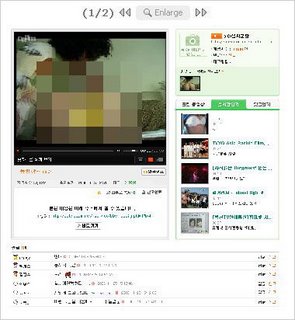 A picture is worth - well, in this case, absolutely nothing. Those of you who are old enough to remember when most news was just text and there were only a few pictures - usually only with the headline story - might be impressed by how vivid the news is now with all of its pictures.
A picture is worth - well, in this case, absolutely nothing. Those of you who are old enough to remember when most news was just text and there were only a few pictures - usually only with the headline story - might be impressed by how vivid the news is now with all of its pictures.“Because it was the weekend, I was watching video clips for fun with my family -- I was absolutely shocked to see the porn clips,” one lamented. “I never thought such a thing would happen. A lot of children may have watched it; it must never happen again.”



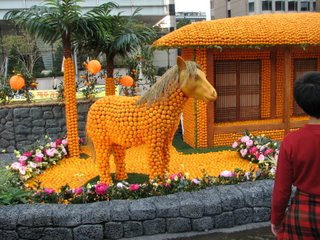
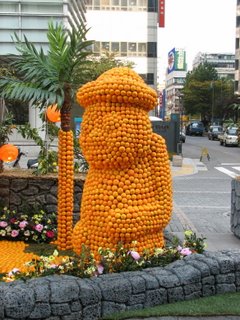

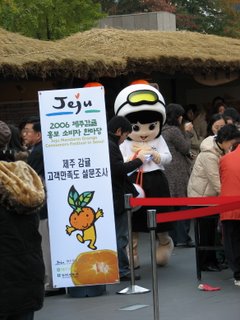
...President George W. Bush said Friday that the American experience in Vietnam contained lessons for the war in Iraq. Chief among them, he said, was that "we'll succeed unless we quit.""We tend to want there to be instant success in the world," Bush said after a lunch with Prime Minister John Howard of Australia, "and the task in Iraq is going to take a while."
...Gangwon police said the taking of nude photos was a time-honored practice in the barracks of the unit when members were promoted. (There's nothing honorable about this, and I guarantee that my students who are soon to enter the military don't think it is okay.)
 I walked from my apartment (in the middle of the picture on the left) on the south side of Namsan. I went up to the Hyatt Hotel, then to top of the mountain and Seoul Tower then down to the west; then I walked back up to the peak and down the other side to where I started (kind of a Figure-8). In total, it was about 10 kms and took about 4 hours. The air was relatively clear, and there was very little second-hand smoke. I think the signs warning about the danger of forest fires have a lot to do with that (although ignoring signs is a national pasttime). It also may be that the hike up the mountain doesn't appeal to smokers.
I walked from my apartment (in the middle of the picture on the left) on the south side of Namsan. I went up to the Hyatt Hotel, then to top of the mountain and Seoul Tower then down to the west; then I walked back up to the peak and down the other side to where I started (kind of a Figure-8). In total, it was about 10 kms and took about 4 hours. The air was relatively clear, and there was very little second-hand smoke. I think the signs warning about the danger of forest fires have a lot to do with that (although ignoring signs is a national pasttime). It also may be that the hike up the mountain doesn't appeal to smokers.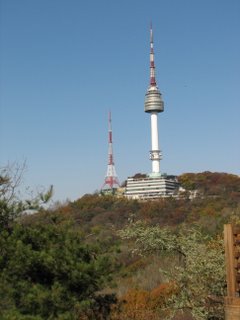 I hadn't been up the Seoul Tower since November 1976 (30 years ago), so I decided to splurge and pay the W7,000 to go up to the observation area. It's a lot nicer now than it was years ago. There isn't much point in going up the tower if the air isn't clear, but, on a nice day, it's worth it.
I hadn't been up the Seoul Tower since November 1976 (30 years ago), so I decided to splurge and pay the W7,000 to go up to the observation area. It's a lot nicer now than it was years ago. There isn't much point in going up the tower if the air isn't clear, but, on a nice day, it's worth it. If you don't want to hike up, there is a tram on the north side of the mountain. Buses and taxis also go as far as the Tower.
If you don't want to hike up, there is a tram on the north side of the mountain. Buses and taxis also go as far as the Tower. Along the paths, there are several good clean toilets, a number of
Along the paths, there are several good clean toilets, a number of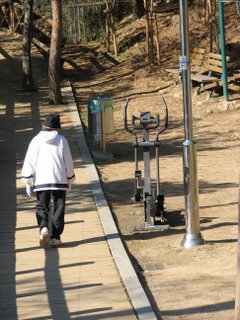 wooden platforms where you can sit and have lunch, and several fitness areas (Yes, that's a real Nordic Track strider). I'm quite amazed by the lack of theft and vandalism in Korea. If we had weights and exercise machines in parks in most Canadian cities, they would last a couple of days and then they would be gone or trashed. Here, the equipment is used by a lot of people (especially older guys) and it is in reasonably good condition.
wooden platforms where you can sit and have lunch, and several fitness areas (Yes, that's a real Nordic Track strider). I'm quite amazed by the lack of theft and vandalism in Korea. If we had weights and exercise machines in parks in most Canadian cities, they would last a couple of days and then they would be gone or trashed. Here, the equipment is used by a lot of people (especially older guys) and it is in reasonably good condition.

 When I lived here years ago, everyone thought that I looked like Marc Singer. Yeah, right. We all look alike.
When I lived here years ago, everyone thought that I looked like Marc Singer. Yeah, right. We all look alike.
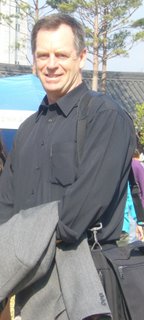
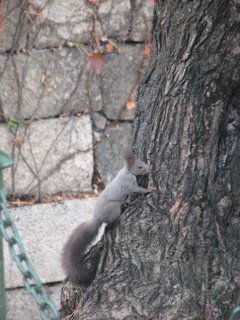 To the best of my knowledge, this is a Eurasian Red Squirrel. Apparently, even though it is called a red squirrel, the color can range from black to red and everything in between.
To the best of my knowledge, this is a Eurasian Red Squirrel. Apparently, even though it is called a red squirrel, the color can range from black to red and everything in between.
...The second article was a BBC news story about the impending demise of the oceans' fish.
He regrets that after decades of campaigning for everything from cleaner air to sustainable farming, his work has not had more impact.
...
"I feel like we are in a giant car heading for a brick wall at 100 miles an hour and everyone in the car is arguing where they want to sit. For God's sake, someone has to say put the brakes on and turn the wheel."
...
"The way we use the oceans is that we hope and assume there will always be another species to exploit after we've completely gone through the last one," said research leader Boris Worm, from Dalhousie University in Canada.
"What we're highlighting is there is a finite number of stocks; we have gone through one-third, and we are going to get through the rest," he told the BBC News website.
...
"You have scientific consensus and nothing moves. It's a sad example; and what happened in Canada should be such a warning, because now it's collapsed it's not coming back."
 I wrote this several years ago, but the recent post of a blog calling into question the sexual orientation of several young girls holding hands reminded me of the issue (I'm sure he wasn't really serious; however...). So, I thought I would take it out, dust it of, tweak it a little, and post it.
I wrote this several years ago, but the recent post of a blog calling into question the sexual orientation of several young girls holding hands reminded me of the issue (I'm sure he wasn't really serious; however...). So, I thought I would take it out, dust it of, tweak it a little, and post it.When I first came to Korea in 1976, I was amazed, and perhaps shocked (as a Canadian of Scottish descent brought up in a culture where same-sex touching was not common), to see that everyone was touching. Both men and women held hands or walked arm in arm with same-sex friends. In 1983 when I came back, it was still common to find friends closely linked together or drapped all over each other. When people talked, they often seemed to need to be in contact with the person they were talking to. When men shook hands, they often didn't let go until the conversation ended. In returning to Korea in 2002, I was again shocked but this time by the lack of touching.
I recently spoke to a group of middle school teachers about this, and the majority of the teachers said they had been told over and over by western teachers at English language schools that westerners thought that same-sex friends who held hands actually were (or would be perceived to be) homosexuals. These Korean teachers in turn spoke to their young students, and a social change seems to have begun.As an English teacher, I admit that I have in the past counselled Samsung electrical engineers who were going to the U.S. to study not to hold hands nor to sit on their friends’ knees in a lounge IN THE U.S. I have also explained that the three-second handshake would be much better when shaking hands with westerners than the older Korean custom of shaking hands and not letting go for the duration of the ensuing discussion. I’m horrified now to think that I have contributed to this unhealthy fear of touching that North American culture seems to have. The close and long-lasting bond of Korean friendship often filled me with envy, and I hope that whatever changes occur in Korean society are the result of Koreans’ desire to improve their society, not by some misguided attempt to become western or to avoid offending us. For those of us who are visitors to Korea, perhaps we should remember the adage, “When in Rome, do as Romans do.” If Koreans' touching bothers us, maybe WE need to get over it.
We will be walking quite a lot for several hours on gravel paths, cobble stones, and up and down lots of stone stairs. Please wear sensible shoes.
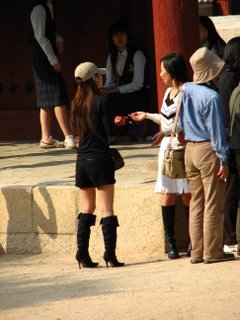 Now, this woman is beautiful and those boots do look like Nancy Sinatra's boots that were made for walking, but, really....how comfortable could those be under the best of circumstances. I suspect that, under that rather fetching baseball cap, there is a vacuous space.
Now, this woman is beautiful and those boots do look like Nancy Sinatra's boots that were made for walking, but, really....how comfortable could those be under the best of circumstances. I suspect that, under that rather fetching baseball cap, there is a vacuous space.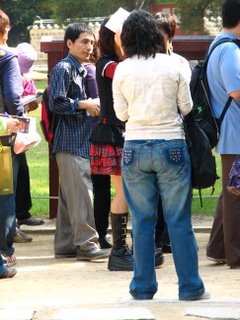 I always like a woman in flats, so this girl misses out. What was she thinking? This is a palace tour. Does she expect to meet Bae Yong Jun?
I always like a woman in flats, so this girl misses out. What was she thinking? This is a palace tour. Does she expect to meet Bae Yong Jun?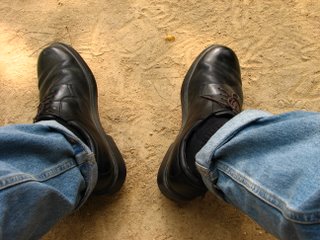 You might ask what I was wearing - Rockports, of course.
You might ask what I was wearing - Rockports, of course.